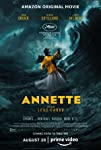Eye For Film >> Movies >> Annette (2021) Film Review
Annette
Reviewed by: Anne-Katrin Titze

When the Cannes Film Festival jury of Mati Diop, Mylène Farmer, Maggie Gyllenhaal, Jessica Hausner, Mélanie Laurent, Song Kang-ho, Tahar Rahim, and Kleber Mendonça Filho, led by Spike Lee (who announced Julia Ducournau’s Titane as the Palme d’Or winner first), awarded Best Director to Leos Carax for his musical Annette (the opening night selection), starring Marion Cotillard, Adam Driver, and Simon Helberg, accepting the honour (presented by Valeria Golino) were Ron Mael and Russel Mael (Sparks).
“So may we start?” asks the cast in the prologue, marching through the nightly Los Angeles (shot by the great Caroline Champetier), as though they were Judy Garland, Mickey Rooney, and their gang, ready to put on a show. And yet, it doesn’t feel Hollywood, but rather operatic (with costumes by the exquisite Pascaline Chavanne), and a bit Shakespearian in the way the film is bracketed. We are waved in and pushed out simultaneously, in the two-fold manner demon statues treat the visitors at some Japanese temples.

I could not have wished for a more perfect first film to wean me back into the in-cinema press screening world I left behind in March 2020. Annette makes it abundantly clear that the art of cinema is really just beginning, at barely 130 years old, and that there is so much more unexplored territory beckoning. Based on an original story and music by Sparks, lyrics by Ron Mael, Russel Mael, and Leos Carax, with the majority of dialogue sung by the stars, this musical of love and self-hatred begins with the voice of the director asking for our complete attention and telling us about a few things we better do solely in our heads (sing, clap, or yawn are not even half of them). “Breathing will not be tolerated during the show,” this is a command, followed by the polite first song.
Although Jacques Demy’s Les Parapluies De Cherbourg, another movie with all the dialogue sung, may come to mind - plus the colour palette being just as precise and vibrant here - Annette shares more with another Michel Legrand/Demy collaboration, namely Peau d'Ane, which includes a variety of numbers that show what can be expressed in song (everything from incest being a bad idea, to a cake recipe, to how too much love can be really difficult to handle).
The story of Annette is simple enough. Ann, played with grace and strength by Marion Cotillard, is an opera star whose specialty is dying on stage. She loves Henry (Adam Driver), a successful stand-up comedian, who chose the stage name the Ape of God, and performs as if he were a boxer, hurling insults at the public. Ann and Henry love each other so much and profess this feeling during a stroll in the canyons and on the way back to their LA home on his motorcycle.
Cotillard’s physical expression of Ann, who is mainly dressed in yellows and reds, enforces her being a caring, creative, and slightly puzzled creature of flowers, sun, and blood. As her star is rising, Henry’s act becomes more and more abusive and self-abusive. Driver dives deep into the murkiness of fame and disgust. His colour is green, his envy grows. The four singers in lacy verdant negligees from the prologue will be his support chorus for a while.
Carax loves cars and motorcycles and when Ann, in the back of her limousine, bites into the first of a number of bright red apples, the link to Holy Motors is clear. The imagery may conjure up Snow White, there even is a mirror by the long green swimming pool they have behind their beautiful house in the hills, where she will have another apple. Is vanity the key? During an opera sequence she resembles Sterntaler or Star Coins, the little orphan girl from the Grimms’ collection, who gives and gives, and doesn’t dare ask for anything in return.
Henry’s fruit is the banana, he is the king of monkeys. His grotesque act includes faux hanging himself with his microphone cord, which he also uses to swing at the front row. Hatred and indignity are his game. “Why did you become a comedian?” the audience in a chorus chants. “I have sympathy for the abyss” is his response, while setting banknotes on fire. Driver really goes for it as Henry becomes more and more unhinged, part scissor man from Struwelpeter, part drunken James Mason from George Cukor’s A Star Is Born. Is she too perfect for him and he a mere insect? You bet. Meanwhile, Ann dies and dies and dies in every role she plays. His outlet is the motorcycle.
During a wonderful early Edward Hopper moment, Henry picks up Ann after her performance, surrounded on the steps by autograph hunters and fans, and they exchange how their respective evenings went. “I killed them,” he says. “I saved them,” says she. Yes, “counterintuitive, Baby”, as they may seem, their tragic bond is real. Carax’s spectrum is so wide and he and the Mael brothers combine counterintuitive elements in such new ways, that the film does indeed leave you breathless more than once. There is Nosferatu tickling time, and there are the photo-romance-like “Show Biz News”, inserted, as though they were number cards in a cabaret, to inform imaginary TV audiences about the latest gossip on the couple.
When Ann and Henry have a baby, the title character, who has very special powers, things take an altogether different turn. Leave it to Carax to embed the deepest emotions into the greatest artifice. He is aided again by his genius cinematographer, Champetier, who captures the fragility and resilience of childhood in a single shot of toys moving on a shelf in a cabin on a boat during a violent storm. A paper whale and a home-made mobile consisting of a torn tree branch from which hang suspended colourful origami cranes, illuminate that a kid is not a toy.
Simon Helberg, as the accompanist, to be conductor and babysitter for Annette, is in the classic tradition of the comedic musical sidekick, such as Oscar Levant or Donald O’Connor, or the pal who doesn’t get the girl, played by Ralph Bellamy or Tony Randall. Only here there is a depth he is allowed to have, a knowledge about ambition, exploitation, weakness, and boundaries that makes you retroactively reflect back on all these other supporters who came before him. Which takes nothing away from Helberg’s impeccable comedic timing.
Cotillard’s wig - the colour of Denis Lavant’s hair in his M. Merde persona - doubles as a red cap. She has already met the wolf, perhaps confirmed much later by the shot of a coyote in the hills. During one of her performances, the witch’s house as she leaves the forest, is nothing but the audience in the opera house awaiting her. Driver’s locks are more Wagnerian than hers.
No one works with dream sequences the way Carax does. After watching a report on the very real wild fires in California, Ann falls asleep in the limousine and has a nightmare about a panel of women coming forward accusing Henry of abusive behaviour. He, on the other hand, thinks of the avalanche of ways she dies on stage and tells his audience in Las Vegas that he has no desire left for his wife now and how he actually tickled her to death. As he rides back in the night on his motorcycle through the desert and screams out his anger to the world, Ann in the most Kurt Weill-ish of songs, contemplates the wonderful gift, the wonderful child she has, but how something is so terribly, terribly wrong.
The Brechtian quality of the songs’ lyrics is present throughout. People express who they are and what they feel more directly than one usually encounters in cinema and in life. I am an evil capitalist here becomes I am a boundlessly destructive and insecure comedian and this is what I do with the love given me. The V-effect on the ocean in Annette tops even Hitchcock’s use of back projections for Marnie and is just as thought-provokingly intense. When the floor of an Island resembles the insides of a brain, and a ghost of the sea, sporting long algae hair and Matthew-Barney-like shoulder cartilage spikes, is a matter-of-fact visitor, the cinematic experience is wide open.
Star Coins will return with an old-fashioned rotating children’s lamp of the moon and the stars and magical powers to boost. A visiting spirit who rolls into a snuggling position into Henry’s body on the bed is not a real phantom, but a mere fantasy. A black lizard, curled up in a deflated, faded swim-animal in the overgrown garden by the empty pool is part of nature taking back.
Henry has a purple mark with little tarantula-like legs on his face. Throughout the film, it grows and grows, like the arachnid on the protagonist’s cheek in Jeremias Gotthelf’s 1842 novella The Black Spider. “Now you have nothing to love,” says little Annette (Devyn McDowell), once she has become a real girl, a sentence more damning than any devil’s bargain could be.
Don’t leave when the end credits start to roll, or you’ll miss a wondrous Midsummer Night’s Dream goodbye, a parting moment that reminded me of John Singer Sargent’s 1885 painting Carnation, Lily, Lily, Rose, transposed on the entire crew - an enchanted parting gift with paper lanterns.
Annette opens in the US on August 6 (Amazon Prime Video on August 20) and will screen at Edinburgh Film Festival before opening in the UK on September 3.
Reviewed on: 25 Jul 2021
















